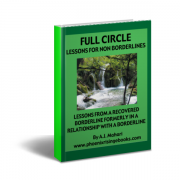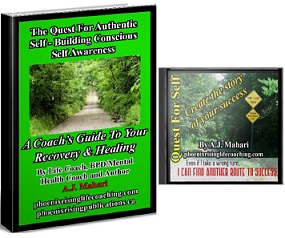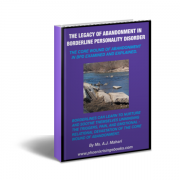![]()
Why can't I get close and stay close to anyone?
Why can't a person with Borderline Personality Disorder (BPD) get close and stay close to anyone? You many think that there are many complicated reasons for this. NO! There is one very simple 'sounding' reason. The reason is simple for me to identify in hindsight after having wrestled with it more times than I could count. However, the reason why most people with BPD can't get close or stay close to anyone is not as simple to change as it is to identify.
In order to be close, one must also know how to be distant.
Closeness, at times, requires distance at other times. In other words, in order to be successfully intimate one must know how to be alone.
Most people with BPD cannot tolerate being alone, for long, if at all. Though there may be many speculated reasons as to what is behind the fear of being alone my experience has taught me that the fear of being alone truly arises from the very basic fact that up until a certain point of healing, most borderlines, really, DO NOT KNOW WHO THEY ARE. So, in effect, who are they going to be alone with? For me, in the past, being alone was like being "in the past"; being alone was also like being in the company of all of my past abusers. Why? Because I did not have any sense of who I was. Therefore, I did not feel safe, alone, by myself. I felt needy and scared and like a little kid. I was living in the past. In my past being alone meant I was going to be hurt and or abused by someone older, bigger, stronger, and more powerful.
In my experience one must first learn to heal the wounds of the past. As you begin to get a sense of who *you* are in the here and now, and truly differentiate that from the past then one can learn how to be safe. When you have learned how to be and how to feel safe on your own, by yourself, and alone, then you will come to experience being with others in very new and different ways.
I believe that it is the very essence of borderline "neediness", and its incumbent demanding nature that often goes along with that in "close" quarters that precludes a true sense of close intimacy from developing. The borderline often is confronted with a major dilemma here--wanting closeness but fearing it equally as much. In my life I came to understand this dichotomy by going back to what has happened when I was or had "felt" close to anyone in my past. In my past when I had felt close I was hurt, I was sexually abused, shamed and humiliated. So, why would I want that again? Until I worked through those issues and matured more emotionally to the point where I wasn't left re-living my past when I was trying to get close to someone, it simply hurt way too much to even try to be close.
Intimacy requires time and space. There is an ebb and flow to closeness. Being close also involves being distant. As human beings we have a natural need for both. They cannot co-exist simultaneously. Often, when two people are in a relationship, for example, one will require some distance at a time when the other wants to feel/be close. It is during times like this that a relationship, or friendship can be made or torn apart. It is the responsibility of each person in a relationship to meet their own individual needs first. It is not the job of any one partner to meet their partner's needs first. Often borderlines demand this. It creates havoc in relationships. It is not healthy. It stems from the borderlines lack of ability to meet their own needs first. A healthy relationship is two whole people coming together and not two halves looking to be one whole.
Intimacy and being close to others requires that you know how to be alone. Intimacy also requires that you meet your own needs.
Closeness can only be achieved when each person has the capacity for healthy risk, vulnerability and an open honesty that respects self and other.
Why can't a person with Borderline Personality Disorder (BPD) get close and stay close to anyone? Most people with BPD (until they heal many of the traits) are not able to be alone. Being alone, in tandem with taking care of one's own needs is what is required in order to achieve an intimate closeness emotionally with another human being. Being alone, knowing who you are (to some definable degree) and feeling safe with yourself are also prerequisites for healthy, lasting closeness in any relationship.
© Ms. A.J. Mahari - May 23, 1999















